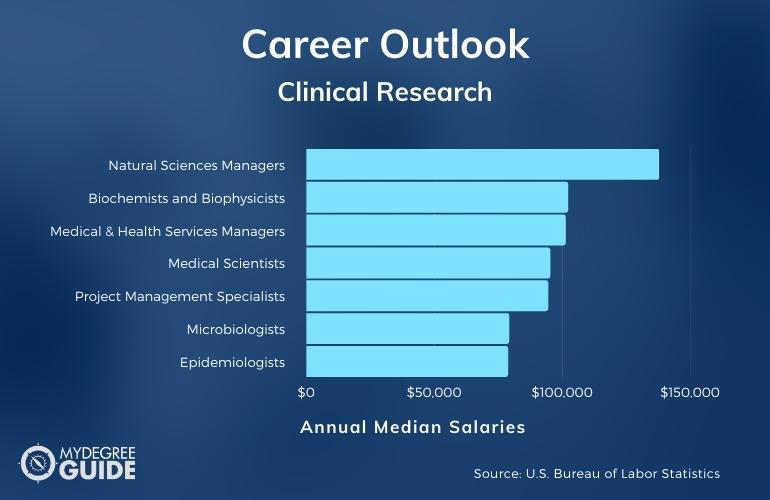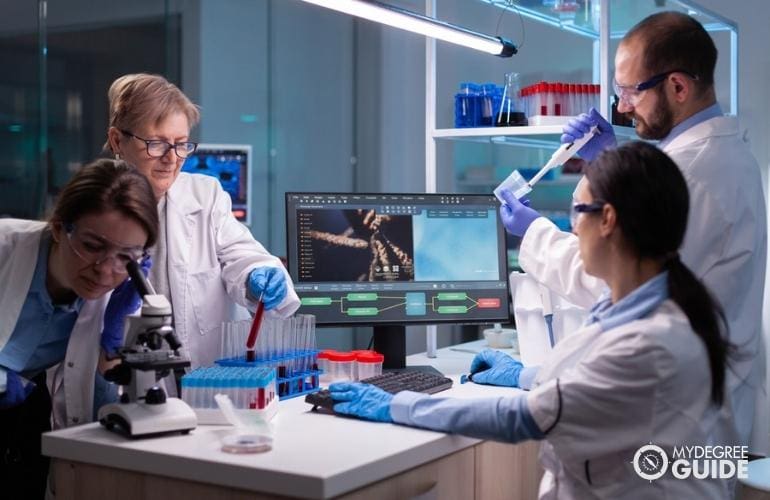Earning a masters in clinical research can help prepare you to make an impact on the lives of people struggling with illnesses and health challenges.

For society to thrive, it’s essential to maintain public health, and clinical researchers play a key role in ensuring that this happens. If you are interested in healthcare and enjoy gathering data, analyzing outcomes, and developing test parameters, then a career in clinical research may be fitting for you.
Editorial Listing ShortCode:
To embark on this path, you can begin by exploring high-quality online clinical research master degree programs.
Online Masters in Clinical Research Programs

The development of new and improved medical devices, drugs, and procedures is crucial to the healthcare field, but they can’t be used unless they are found to be safe and effective. This is when expertise in clinical research comes into play.
Clinical researchers are responsible for conducting clinical trials, which are research studies that evaluate whether a medical treatment is worthwhile. A master’s in clinical research helps prepare students to take part in this vital process, which ultimately improves health outcomes.
Editorial Listing ShortCode:
During a clinical research graduate program, you’ll learn about subjects related to the creation and administration of clinical trials. There is typically a heavy focus on scientific concepts, communication skills, and relevant areas of math, like statistics.
The curriculum for clinical research programs often includes topics like:
- Epidemiology
- Ethics
- Biostatistics
- Regulations and compliance
- Monitoring and managing research studies
- Leadership
- Review boards
- Choosing and working with human subjects
- Designing clinical trials
These areas of study help you prepare for the core responsibilities of clinical researchers:
- Recruiting and screening patients
- Overseeing patient care
- Documenting and submitting findings
After developing their knowledge and skills, many clinical researchers go on to have careers in areas directly related to the scientific study of medical treatments. These positions include:
- Medical scientists
- Epidemiologists
- Microbiologists
- Biochemists
Some clinical research professionals focus on other aspects of the field, such as management, medical writing, data analysis, and survey research. While they may not directly oversee trials, they make direct contributions to the system of clinical research.
After completing a Master of Clinical Research online, graduates often have a wide pool of potential employers. Pharmaceutical companies, medical device developers, hospitals, and universities all hire clinical research professionals to conduct trials and research studies.
Many clinical research professionals work in laboratories, offices, and clinical settings. Some positions may also require travel, particularly for researchers who work in the field or focus on infectious diseases. A degree in clinical research can also offer flexibility in terms of location. Public health is a pressing concern for everyone, so there may be job opportunities available in areas in different parts of the world.
Clinical Research Careers & Salaries

Much like with online healthcare administration degree programs, after completing a Master of Science in Clinical Research online, you may be qualified for a variety of positions within the medical field.
Professionals with expertise in clinical research are often responsible for making critical assessments and decisions regarding the efficacy of medical treatments. In recent years, there has been growing emphasis on the importance of clinical research. As a result, many jobs in this area pay above average salaries.
According to the Bureau of Labor Statistics, here are the median salaries for some of the common areas of employment for clinical research professionals.
| Careers | Annual Median Salaries |
| Natural Sciences Managers | $137,900 |
| Biochemists and Biophysicists | $102,270 |
| Medical and Health Services Managers | $101,340 |
| Medical Scientists | $95,310 |
| Project Management Specialists | $94,500 |
| Microbiologists | $79,260 |
| Epidemiologists | $78,830 |
| Health Education Specialists | $60,600 |
| Clinical Laboratory Technologists and Technicians | $57,800 |
| Community Health Workers | $46,590 |
As the focus on public health has increased, so has the demand for qualified candidates with experience and education in clinical research.
Editorial Listing ShortCode:
The Bureau of Labor and Statistics projects that several of these positions will be in very high demand over the next ten years. For example, the projected growth rate for epidemiologists is 26%, and the projected growth rate for medical and health services managers is 28%. These are both significantly higher than the average growth rate of 5% for all occupations.
MS in Clinical Research Curriculum & Courses

When pursuing an MS in Clinical Research, you’ll be required to complete a certain number of core courses and electives. While the specific curriculum can differ greatly between programs, these are some of the common courses for clinical research graduate students:
- Epidemiology Research: This course teaches you how to approach epidemiological issues, including the evaluation of measurements, symptoms, and diagnostic and treatment strategies.
- Regulations and Compliance: Students in this class explore the regulatory requirements for pharmaceuticals, biologics, and medical devices.
- Patient-Oriented Research: The focus of this course is on how to properly create and administer research while prioritizing the safety and well-being of patients.
- Clinical Trial Design: This course helps you understand the complex regulatory controls and governing bodies that oversee clinical trials.
- Bioethics: In bioethics, you’ll learn about ethical challenges within medical care, including differences in cultural beliefs.
- Biostatistics and Data Management: This class focuses on the use of statistics and data, including correlation and regression analysis, sample size calculations, and hypothesis testing.
- Management of Clinical Trials: In this course, you’ll learn about the core principles of managing clinical trials, including an examination of current regulations.
- Scientific Writing: In this course, you’ll learn how to communicate effectively within a professional setting.
- Community Health: In this class, you’ll learn about the history of community health and the role that clinical trials play in improving patient outcomes.
- Quality and Risk Management: This course explores the methods that professionals use to maximize quality and minimize risk when developing and administering clinical trials.
In addition to these courses, many master’s in clinical research online programs also require students to complete a practicum and capstone project. These give you the opportunity to have hands-on experiences and demonstrate all the knowledge you have gained during the program.
Admissions Requirements

Each school can have varying requirements, but here are some of the overlapping criteria for many graduate programs:
- Test scores. Some schools require GRE or GMAT scores for graduate admissions, but a growing number of schools do not.
- Transcripts. You’ll provide official transcripts for your previous undergraduate work.
- References. You might ask former instructors and supervisors to describe your strengths and abilities in letters of recommendation.
- Personal statement. With this statement, you can explain your goals and interests.
- Resume. It’s beneficial to include all relevant work, education, and volunteer experience.
Most schools also require you to submit an official application and pay a fee.
Accreditation

When you explore clinical research graduate programs, it’s crucial to determine whether prospective schools are accredited. Regional accreditation is especially beneficial, as it is the most widely recognized accreditation status. Colleges and universities must meet high standards to be approved by a regional accrediting body.
Editorial Listing ShortCode:
Should you need to change programs or seek admission to a doctoral program in the future, it is generally easier to transfer credits from a regionally accredited school. Future employers may also view a degree from an accredited school more favorably.
Financial Aid and Scholarships

Many graduate students seek financial aid opportunities to help fund their education. One of the first steps for many students is to submit the Free Application for Federal Student Aid (FAFSA), which determines whether you are eligible for need-based aid from the federal government.
Some states have aid programs as well, which you can research through your school of choice or state government. Scholarship opportunities are another common source of financial support. You could research scholarship or grant programs that are available for your particular major or circumstances.
If you are currently employed, you could also speak to your employer about any available tuition assistance or reimbursement programs. Some companies help pay for their employees’ ongoing education as a form of professional development.
What Is a Clinical Research Masters Degree?

A clinical research masters degree is intended to help students prepare for work related to testing and evaluating new medical products. Much like an on-campus or online clinical research certificate program, a masters degree program can be useful for students who hold a bachelor’s degree in a medical field and are interested in learning about innovative treatments.
You can learn about the scientific principles behind running clinical trials, ethical concerns when working with human subjects, and the proper methods for analyzing and documenting research findings. Some clinical research programs also include coursework in management and business topics, such as marketing.
What Can You Do with a Master’s Degree in Clinical Research?

Many types of employers hire graduates of clinical research master’s programs. This includes government agencies, hospitals, health clinics, and research universities. Some graduates are well-positioned to work as epidemiologists, medical services managers, medical scientists, or biochemists. They may work in a lab overseeing clinical trials and analyzing the results.
Other potential avenues of employment include pharmaceuticals and medical device companies. They hire clinical researchers to help evaluate their products and determine whether they are effective. There are also a number of job opportunities for clinical research coordinators and associates.
How Much Can You Make with a Masters in Clinical Research?

The amount of money you could earn in a clinical research position depends on several factors, including location, seniority, and the type of employer. In general, careers in this area pay above-average salaries.
For instance, according to the Bureau of Labor Statistics, biochemists and medical and health services managers have median salaries of over $100,000 a year. Microbiologists and epidemiologists have median annual salaries above $75,000. These earnings are well above the median wage for all areas of employment, which is $45,760.
Editorial Listing ShortCode:
The Bureau of Labor Statistics puts the position of clinical research coordinator or clinical trial manager under the wider category of natural sciences managers. Most of these professionals earn between $75,040 and $208,000.
How Long Does It Take to Get a Master in Clinical Research Online?

Most clinical research masters online programs require between 30 and 36 credit hours. Students who attend full-time and take courses year-round, including during the summer, may be able to finish within 1 year.
If you attend school part-time, the period of completion will often be longer, generally 2 years or more. Programs with a thesis requirement or extended practicum may also require a longer time investment. Some colleges and universities offer dual clinical research programs that allow students to complete their bachelor’s degree and master’s degree together in 5 years.
Is a Masters in Clinical Research Worth It?

Yes, a masters in clinical research is worth it for many students. This degree path can help prepare you for careers that are professionally and personally rewarding. You may have a direct effect on public health outcomes on a national or global scale.
Working in clinical research also offers a high level of job security. According to the Bureau of Labor Statistics, jobs in this area are projected to remain in demand over the next ten years. Natural science managers and clinical laboratory technologists and technicians are expected to see steady, average growth.
Editorial Listing ShortCode:
Meanwhile, the job growth rates for biochemists and biophysicists (15%) and health education specialists and community health workers (12%) are much faster than the average for all occupations.
Universities Offering Online Masters in Clinical Research Degree Programs
Methodology: The following school list is in alphabetical order. To be included, a college or university must be regionally accredited and offer degree programs online or in a hybrid format.

Arizona State University offers an online program for a Master of Science in Clinical Research Management. It requires the completion of eleven classes for a total of 33 credit hours. Each class is 7.5 weeks long. It culminates with a clinical research capstone project. Accepted students may enroll full-time or part-time.
Arizona State University is accredited by the Higher Learning Commission.

Campbell University’s Master of Science in Clinical Research can be earned 100% online. Each course is 8 weeks long, and students can potentially finish in 2 years if they take two courses per term. Campbell’s online courses are designed to facilitate interaction and discussion among students and professors.
Campbell University is accredited by the Southern Association of Colleges and Schools Commission on Colleges.

Drexel University offers an MS in Clinical Research for Health Professionals. This online program requires the completion of 36 credits and can typically be completed in 2 to 3 years. Students are never required to come to campus or complete a thesis. Drexel’s online learning platform is designed to be simple and interactive.
Drexel University is accredited by the Middle States Commission on Higher Education.

George Washington University offers an online program for an MSHS in Clinical and Translational Research. This 36 credit program usually takes 2 years to complete. The curriculum consists of courses such as Critical Analysis of Clinical Research, Clinical Investigation, and Foundations in Clinical and Translational Research.
George Washington University is accredited by the Middle States Commission on Higher Education.

Georgetown University offers a Master of Science in Clinical and Translational Research. The program requires the completion of 33 credits, which can be completed on a full-time or part-time basis. Students can choose a concentration in Clinical Trials and Research, Health Disparities and Community Engagement, or Mechanistic and Biomedical Research.
Georgetown University is accredited by the Middle States Commission on Higher Education.

Massachusetts College of Pharmacy and Health Sciences offers a Master of Science in Clinical Research that can be earned online or on campus. The degree usually takes about 2 years to finish, and students may study full-time or part-time. The curriculum consists of courses such as Conducting Clinical Research Studies, FDA and Regulatory Affairs, and Health Epidemiology.
MCPHS University is accredited by the New England Commission of Higher Education.

Ohio State University offers a Master of Clinical Research that can be earned 100% online. Students can choose between a track in Regulatory Affairs or Clinical Research Management. Potential courses include Responsible Conduct of Research, Fundamentals of Medical Product Development and Regulation Affairs, and Clinical Research Design and Methods.
The Ohio State University is accredited by the Higher Learning Commission.

Rutgers University offers an MS in Clinical Research Management. This multidisciplinary program requires the completion of 36 credits and uses a hybrid online and in-person format. Three tracks are available within the program: Clinical Research Management, Drug Safety and Pharmacovigilance, and Academic Clinical Research Management.
Rutgers University is accredited by the Middle States Commission on Higher Education.

St. Cloud State University offers an MS in Applied Clinical Research. The program is available in both an on-campus and a synchronous, online format, and classes meet during evenings and on weekends. Classes are taught by instructors with practical experience in the industry. New cohorts start every fall.
St. Cloud State University is accredited by the Higher Learning Commission.

The University of Minnesota offers a Master of Science in Clinical Research that can be earned on campus. The program provides mentorship from researchers and physicians. To graduate, students must complete 38 credits. The curriculum consists of courses such as Foundations of Public Health, Fundamentals of Clinical Research, and Clinical Epidemiology I and II.
The University of Minnesota is accredited by the Higher Learning Commission.
Getting Your Masters in Clinical Research Online

If you are fascinated by cutting-edge developments in medical technology and pharmaceuticals, you might be interested in a career in clinical research. Professionals in this field can research innovative medical products and help ensure that they are appropriate for human use.
A master’s in clinical research may help you qualify for positions with a variety of employers who are seeking candidates with expertise in conducting clinical trials. While completing your degree, you can gain knowledge in science, statistics, professional writing, and leadership.
You can get started on this academic and career trajectory by exploring online clinical research masters programs from accredited colleges and universities.

